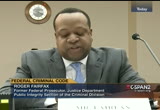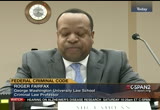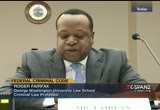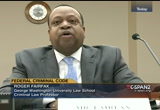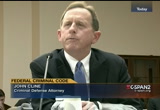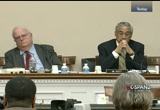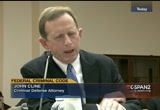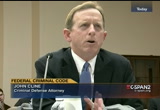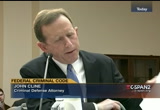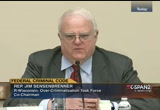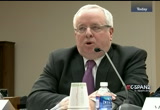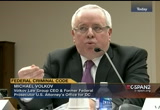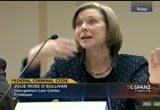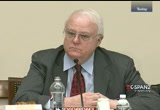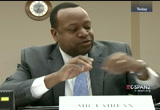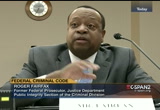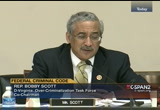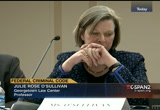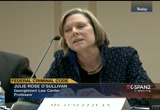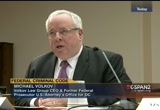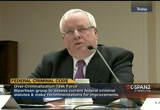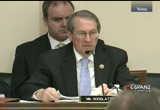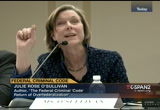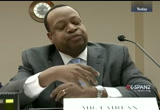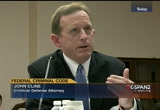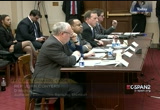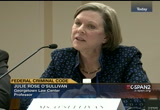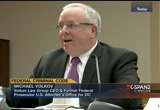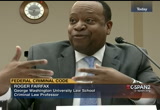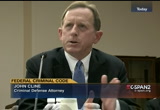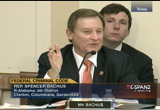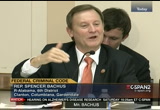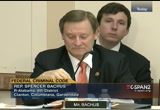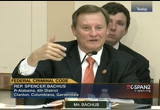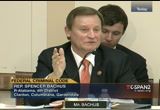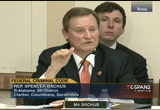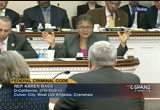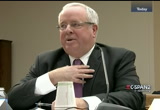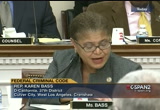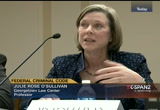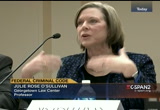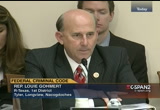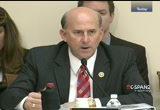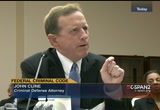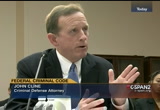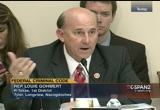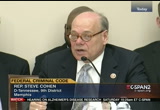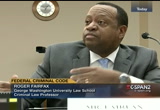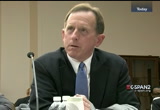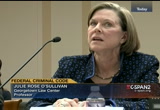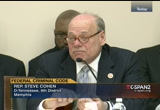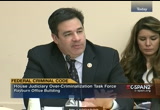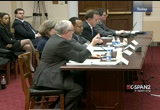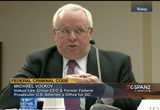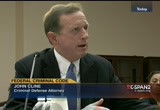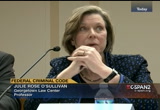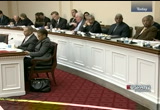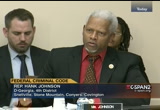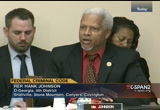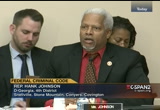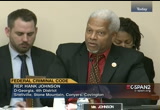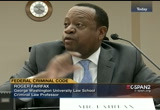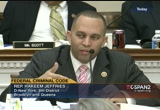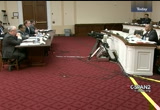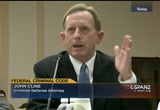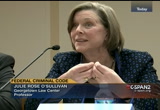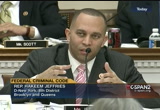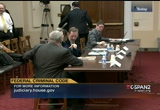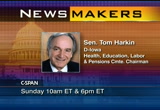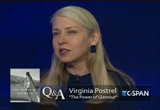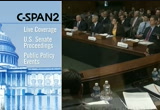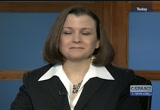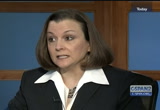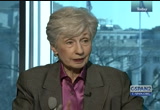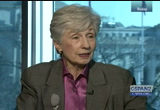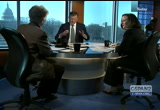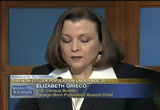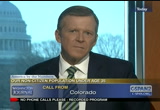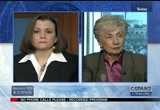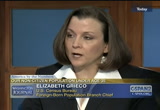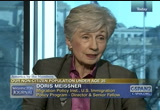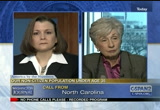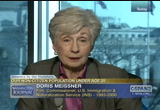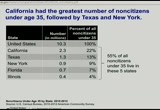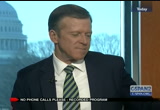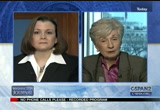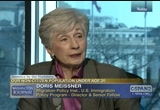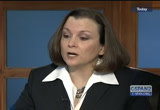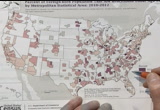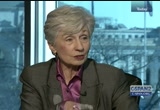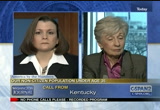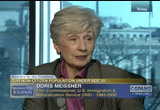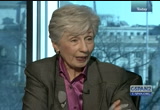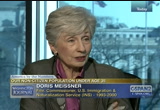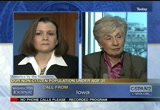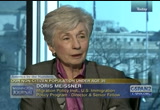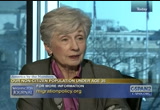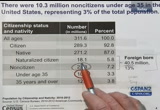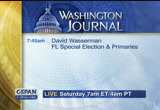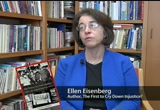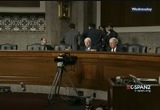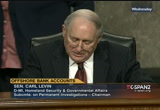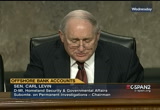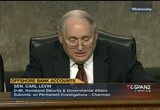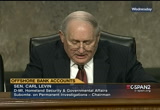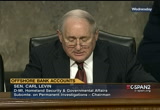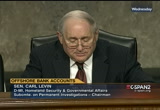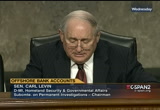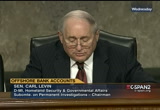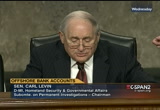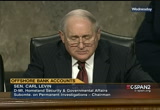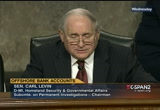tv Key Capitol Hill Hearings CSPAN March 1, 2014 12:00am-2:01am EST
12:00 am
institute0s penal code with elegant organization and forecastsmanship and attention to principles of culpability. with the model penal code and president johnson's 1965 crime commission as a blackdrop, congress established in 1966 the national commission on the reform of federal criminal laws, commonly known as the brun commission. the 1971 final report of the brown commission proposed a new code, and this proposed code included a general part that set out definitions, offenses, principles for liability, and general standards for the exercise of federal jurisdiction, and containedded a comprehensive collection of all federal felony offenses. despite the brown commission's tremendous effort over four years the proposed comprehensive federal criminal code was never enacted into law, although there
12:01 am
were repeated attempts in the house and senate for a period of almost 12 years. it may be time revisit federal criminal code reform and to be sure, many of the challenges that face congress after the brown commission remain. nevertheless, i believe that we do have a meaningful opportunity for reform. a bipartisan consensus has been developing around the idea we should be smart on crime. and given the current recep different to evidence-based implementation the time may be right for reconsideration of federal criminal code reform. i do have a number of suggestions for consideration if congress were to consider embarking on an effort to revise the federal criminal code. the first is the establishment of a new broadly representative commission, much like the brown commission, to draft federal criminal code reform legislation or to work with existing legislation like chairman
12:02 am
sensenbrenner's bill. the second is a partnership with the stabbed and respected law reform entities such as the american law institute or the aba criminal justice section, and the utilization of the technical assistance of the legal academy and experts in the criminal justice policy community. third, the establishment of a permanent professionally staffed criminal law revision commission in congress that can assist members of committees with technical analysis regarding the question of whether a come -- contemplated new penalty or law is needed, and also the design and drafting of criminal statutes so they're well-constructed and fit appropriately within the larger criminal code. i believe that these ideas derive from the work of individuals who have been involved in criminal code reform efforts for decades, are worthy of consideration. and if the members have questions later i would be happy to elaborate on any or all of these ideas and discussion how criminal code reform might fit
12:03 am
into the larger bipartisan criminal justice reform agenda about overcriminallization. >> thank you. mr. cline. >> mr. chairman, ranking member scott, and -- members of the task force, thank you for the opportunity to share my views as a criminal defense lawyer. a comprehensive revision of the federal criminal code should focus on five main points. reducing the number of federal crimes, ensuring that the revised code strikes a proper balance between federal and state law enforcement, clearly defining the appropriate levels of mens rea, establishing uniform rules of construction, and revising the overly harsh punishment system. i'll take those in turn. fir, reducing the number of federal offenses. the list of federal crimes has
12:04 am
grown from handful in the crimes act of 1790, to thousands today. this has occurred in part because the country has become more complex and also occurs because everytime there's a national crisis the reaction is to enact new federal crimes. the result is a morass of overlapping statutes. the more than two dozen different -- chapter 47. seven different fraud statutes in chapter 63 and i count 19 different obstruction offenses in chapter 73 of title 18. this proliferation of federal offenses has too main practical consequences from my perspective. first of all the sheer number of crimes creates a notice problem. is cities holmes declared that fair warning should be given the to world in language the world would understand, but with the statutory scheme that now exists, fair warning is a fiction.
12:05 am
second, the existence of multiple federal statutes that address the same conduct encourages federal prosecutors to overcharge. some prosecutors take advantage of overlapping offenses to charge the same course of conduct in multiple counts, under multiple statutes. the result is often juror compromise. jurors who can't agree unanimously on guilt or innocence, decide to split the baby. convicts on, some thinking they will give the defendants a break but they can't be told conviction on one conviction on one count is the same as several convictions it will help ensure fairness to defendants. revising the federal criminal code affords the opportunity to address other troublesome areas as well. i'll just touch briefly on one of those, which is conspiracy. justice jackson warned about the
12:06 am
last sprawling and pervasive conspiracy offense. the offense of conspiracy to defraud the united states is especially amorphous. the revision of the code affords an opportunity to think carefully about conspiracy and to focus more clearly on who truly deserves to be caught up in its net. the second principle is restoring the federal and state balance. our federalist system initially contemplated the states would have the primary role in law enforcement. over the last 50 years, however, federal criminal jurisdiction has exploded to the point that almost any culpable conduct can be brought under the federal ambit. to cite examples we have vote buying charged as federal rico offenses. nondisclosure under state campaign finance laws charged is a mail fraud or wire fraud, and
12:07 am
violation0s patronage laws, and drug laws where the gap between federal enforcement and state enforcement seems to grow. reforming mens rea. one area, wilful blindness. a federal doctrine of wilful blindness which is a judge-made notion that allows the awareness of the high probability of a fact and a deliberate effort to avoid knowledge to substitute for actual knowledge, the element that congress provided. that is a dangerous provision for defendants because it weakens the mens rea requirement, which is often the only element excuse met a federal case. revising the code affords the opportunity to look at wilful blindness and make a reasonable decision where whether it should be used or not. the fourth area i uniform rules of construction. one, the rule of lenity. now it's applied in a sort of haphazard, ad hoc way by courts.
12:08 am
a revision of the federal criminal code affords an opportunity to make that other uniform rule of construction so doubts about the meaning of a federal criminal statute are uniformly resolved in favor of the defendant. that's important to fair notice and important to fairness generally. finally, revision of the code affords an opportunity to fix some of the harsh punishment provisions now, especially mandatory minimums that have resulted in a enormous and unnecessarily large federal prison population. thank you very much. >> thank you very much, mr. cline. the chair will recognize members under the five minute rules and will recognize myself. one of the goals in this effort is to try to avoid the traps of having an omnibus revision of the criminal code becoming a debate on numerous criminal
12:09 am
justice policies, from the death penalty to mandatory minimums to disparate sentences and the like. so in order not to repeat the record of failure, the past attempts to revise the criminal code over almost 50 years, i am trying to have at least the first attempt at this be policy-neutral. i'd like each of the four witnesses to give us some advice on how to try to keep it policy neutral, because if it isn't, i think this effort will go down in flames just like the previous ones. >> thank you, chairman sensenbrenner. i see this as the most important prim, which is to stay policy neutral because there's so many issues that have to be addressed with regard to drafting, with regard to inconsistency sunday, with regard to penalties, that
12:10 am
we need to get a foundation document that is almost like the beginning of building a house, that is clear and is done in the right way, with technically making the right choices and consistency. from that point, everybody can then debate the issues. what is the right penalty? should we have a death penalty? but we first need a document that makes sense. and the way to do that is -- i share the recommendation of some type of body, some i don't want to -- you started the antitrust modernization commission in 2006 when we did the judiciary -- department of justice reauthorization bill. that would be some model that could work for, like, rewriting the code in a policy-neutral basis. make that their charge and get a group of people together who are experts in the field to do that.
12:11 am
>> mr. sullivan. -- miss o'sullivan. >> thank you for an he can lend and challenging -- excellent and challenging question. i suggest you guy with what roger mentioned as the general part, which is addressing the sort of default rules for statutory construction, maybe legislating the rule of lenity, and also providing default provisions for mence raia, definitions of mens rea, definitions of when omissions are actionable or not actionable so you can deal with the endemic problems of the code by articulating a general part, much like the alr's model penal coat, that would be sort of neutral because there would be no context. it applies to drug cases, applies to white collar cases, right? and so you'd be forced -- people would be forced to deal with these issues in the abstract on a criminal law basis rather than a political or public policy
12:12 am
basis. >> thank you. mr. fairfax. >> i agree with what -- with both suggestions. i would really urge the idea of having a separate entity body, perhaps undertake a first cut at a lot of these issues. i think it would be much better to have -- doesn't even seem like they're controversial but that later turn out to be -- they're taken up by a commission or by a group in the first case rather than over time in the course of legislative debate. >> thank you. mr. cline. >> mr. chairman, i think true policy neutrality is hard to obtain. in almost any judgment, for example, about mens rea that policy judgments that need be made. the best way to achieve a
12:13 am
politically acceptable result is to have the commission that mr. fair max talked about. i'm on the aba criminal justice standards committee. we have prosecutors, defense lawyers, judges, stakeholders, who meet and try to agree on standards. i think that approach is probably the best way to get to a result that can actually be enacted into legislation. >> thank you very much. gentleman from virginia, mr. scott. >> thank you, mr. chairman. mr. fairfax, you mentioned a couple times the idea of being smart on crime. compared to what we're doing with drug abuse, what would be a smarter approach? >> well, it's interesting. a lot of innovations have taken place right now in the states, and -- i'm sorry -- in the states, and i have been involved with the american bar association criminal justice, state policy implex addition project, and the goal of that project is to show states how
12:14 am
they can enhance public safety, reduce crime and recidivism, and enhance justice and fairness, and save tax taxpayer dollars which is a win, win, win. states that have been successful in working in this area have looked at changes to their sentencing policies and the same way that legislation that i know you and mr. scott have cosponsored. and with regard to re-entry of ex-offenders. michigan, for example, through their prisoner re-entry initiative, has slashed their budget for corrections and has reduced the overall number of beds that are available. so there are lots of great ideas in the states and i'm starting to see them at the federal level. >> several mentions of mandatory
12:15 am
minimums. how do this coincide with the smart on crimes approach. >> the legislative trends we're seeing in congress, with the smart sentencing act, starting to take that question head on. i was actually very positive -- a couple weeks ago i now you, mr. scott, were present at roundtable in which attorney general eric holder, senator mike lee, senator rand paul, participated in a discussion about these very issues, mandatory minimum sentences and all of the aforementioned individuals have either cosponsored legislation or supported a new approach to mandatory minimums and i think that is the trend. >> miss o'sullivan do you want to comment on that and what the value of having all the criminal code in one place, what the value of that would be? >> be delighted to. i think mandatory minimums are
12:16 am
wasteful and injust. they do not permit the kind of recent rough estimate of culpability necessary to a fair justice system, and i think they also target certain populations. in any case, the second part of your question was -- >> putting a all -- >> it's not just tidiness that argues for a tight and discrete code. as a form prosecutor it's almost impossible to figure out the obstruction chapter. it's overlapping, confusing, makes no sense, and also, for example, -- you can charge the same crime under a 20-year count or a ten-year count or a five-year count, which gives prosecutors a lot of power that can be used for good or ill.
12:17 am
and so i think that it's much more efficient. you don't have prosecutors making mistakes. you don't have things being cleaned up on appeal. everybody knows what the rules are. you have notice, and then you're able, once you have this code, to make thoughtful judgments about relative culpability. for example, in my article i talk about these two statutes. one is fleeing from an inf check point, the other statute outlaws female genital mutilations. both five-year counts. makes no sense. but you don't know that until you have a code that you're able to sit back, look at the substance and say, how culpability is this? so, for example, obstructing a judicial proceeding is ten years, did you know that obstructing a congressional investigation is only five years? i don't know why the disparity. >> i want get in one more
12:18 am
question. mr. volcker -- >> i want to address the second part. >> i wanted you to go to you are through your principles. >> i know i'm preaching to the choir here but there has to be a single committee in the congress that supervises, reviews, and legislates with regard to criminal offenses. right now we have other committees that put in criminal offenses into the code, and it is an absolute disaster, and we had to fight that on the staff all the time, and it's -- right now we need to get all of the criminal offenses, all throughout the code, and bring them into title 18 and let the judiciary committee supervise it and monitor it. >> gentleman's time is expired. the chair over the full committee, the gentleman from virginia. >> thank you, mr. chairman.
12:19 am
mr. volkov i like the way you think about that and i have a good idea which committee should have that responsibility for all aspects of the criminal code. i'd like to ask all of you to talk a little bit about drawing the line between where something should be civil and regular la dispore where it should be -- regulatory and where it should be a criminal offense before we get into figuring out what kind of consistency we can have with extraordinary mex raya. we also need to think about what kind of consistency we need to have or can have if possible between what things should by civil and what should be criminal. >> i think that goes treatings the work you have been doing up to this point, that the task force has been doing, which is we get to criminal offenses versus civil offenses based on the impact or the action, the conduct or the failure to act, and the requisite intent.
12:20 am
that is how we do it. we don't say that, for example, something that you have no responsibility for but occurred on your watch or you had nothing to do with it, you should be criminally punished for it. there are civil obligations that can come up in that context if you have a duty to act. but before we make something criminal there has to be an important part of conduct that we're trying to prevent and prevent, and number two there's a culpability state of mind and you have to be consistent with that and what has -- that issue has been diluted and it's been diluted down to such a point that congress does need to act in some respect to fix the intent issue. >> i do. miss o'sullivan. >> i very much aagree. you have to look at harm and culpability and mence ray ia. i have to say this is a particularly important question
12:21 am
in a regulatory sphere. congress very frequently delegates the authority to formulate regulations to an agency and then in advance provides that any knowing violation of the future regulations constitutes a crime. >> so, we're creating a crime without knowing what crime we're creating. >> we don't know what the content yet is. more seriously, nobody -- i don't think anybody is going to count the number of criminalized regulatory offenses. i think as last count there were 300,000. and that strikes me as crazy. also, the courts have interpreted knowingly violate to mean, know that you're doing the conduct that violates the prognosis, -- the provision, not that you knowingly violated the law but you knowingly shipped sulfuric acid without the right label on it. and people can go to jail. that's felony offense. that is a problem.
12:22 am
and that language is used in that supreme court interpretation of that language is used consistently across all these regulatory offenses. so that persons who are mixing two types of -- or not making scaffolding in complains with osha regulations could go to jail. we know they're note going to do that. we don't have the resources to pursue those people. but the problem is the prosecutors -- i was one but they get to pick and choose, and you have potential for arbitrary and discriminatory enforcement. >> mr. fairfax. >> i don't have much to add except that this connects to the initial point, which is what body -- perhaps even within congress -- should have responsibility for implementing, for drafting, and passing
12:23 am
criminal laws, whether it's an exclusive jurisdiction arrangement or referral arrangement as discussed in the napdl without intent policy. whether it's a criminal law commission within congress as we just did. i think those types of solutions can help to address that problem. >> thank you. mr. cline. >> i think part of the problem, part of the reason we're here, is whenever there's a crisis the first reaction is to enact new crimes. that's what has led to the overlapping crimes we had, at fleece part. i think the analysis should work the other way. the first question should be, is an administrative or civil penalty provision something along those lines sufficient to deal with the problem, and only if it's not, then proceed to look to criminal legislation. i think the analysis needs to be
12:24 am
reversed. >> thank you. the gentleman from michigan, mr. conyers, the chairman emeritus of to the committee. >> thank you, mr. chairman. this is one of the more important discussions we have been having on this task force, and i commend the chairman for inviting these witnesses that are here, and i hope that i can work with him on his legislation , which to me present as few problems that we will get into the appropriate time. let me say that professor o'sullivan and anyone else can join in afterwards -- you talked about creating a standing commission or task force to reform the criminal code all at once, so that we can begin this
12:25 am
work, and i see that as an enormous challenge in the legislative system in our country. might you and others comment about who might be on -- what kind of persons would be on this commission? >> yes. thank you for the question. one concern is constitutional. obviously the creation of the sentencing commission sparked a great deal of litigation about whether constitutionally you could vest the power to create sentencing in an independent agency. so i'm very aware that the committee would have to confront how much you could actually delegate and the like. i think that you would have to have a situation much like the commission, where you have judges, practitioners, and you have -- well, here obviously you would have to have members of
12:26 am
congress who participate. i would see it as a fairly broad-ranging group, with a variety of experience, and expertise. >> can i comment? i don't see the commission as being that broad. i think we -- clearly would not a recommend going towards another sentencing commission, because we have a commission which is dealing with nonbinding type of guidelines these days, and i don't think there's any reason to go to that. i do think, though, expert group of practitioners, defense counsel, judges, prosecutors, sitting in a room and saying, the last time the code was reviewed, mr. gainer put one woman in a room and had her go through every page until she was finished. six months later, she came out with, here's everything that i found in 1980s. we need a group of practitioners, just put us in a
12:27 am
room and say, get the job done. no elaborate commissions, not a lot of money, and just get a group of people and do the work. >> interesting. anyone else want to comment? >> yes, sir. >> i would say that -- i actually think the balanced brown commission was relatively well thought out. i would say that there would need to be more representation -- i agree with mr. volkov, needs to be more representation from the practitioner community, and particularly from career and political folks at doj, because what happened in the aftermath he particularly from career and political people at the bowch jay. what happens with the aftermath is there was not buy in from the executivepa branch.gr that is from the executivesro bill. for those to pass this in the life span of one
12:28 am
congress is to have the bill from the outset.l. with the engagement and by and of all stakeholders is essential. >> thank you so much. attorney-client, i do you have any thoughts on how t prosecutors overcharging and c of consequences? even when the jury decides to convict on a few accounts? on some and acquitting on others. but under in the sentencing guidelines and the sentencing practices generally, a conviction on one count is really no different than a conviction on every count. so the defense lawyer has to pitch a no-hitter in essence if
12:29 am
he wants to win the case. jurors don't know that, and the result is compromised verdicts that pose problems. let me give you an example of a prosecuting agency that does what i would say the right way. the antitrust division. when they bring a price fixing case they charge one count. just one count. and so the jury has an up or down decision, guilty or not guilty. that is the fair way to do it. but the multiplication of offenses now makes it very rare that that occurs outside the antitrust context. >> thank you very much. thank you, mr. chairman. >> gentleman's timer is expired. the gentleman from alabama, mr. bachus. >> professor o'sullivan you talked about some of us focus on one thing, others focus on other things. i think that's true. i will tell you, though, that the harsh sentences, i think there's general agreement that
12:30 am
some of the longer sentences are actually not working. probably causing harm. they're almost institutionalize organize causing young people to become criminals. and that our system is failing. we do get -- i think some of the hard questions are plea bargaining. i've gone back and i've talked to defense attorneys, i've talked to prosecutors. prosecutors say to me -- and i used to be an assistant attorney general -- we have to plea bargain. we have to -- if you take this away from us we're not going to be able to get people to plead. but they're not -- they are pleading for the wrong reasons. they're pleading because -- not
12:31 am
because they think they're guilty a lot of times, because if they plead it's to six months and a misdemeanor sometimes. if they try the case, it can be five years or ten years in prisonment, and mr. cline, as he said, there are actually examples of people who are offered six months and a year and no time served, who refuse to plead because they really thought they were innocent. were indicted on 15 counts, were found innocent on 14 of those, with the offer out there of a year and a day if they pled, and went to jail for five years. and the jury -- there was a case in birmingham, i'm aware of, because i -- it was widely reported -- where the jury came out and congratulated the defendants family and yet they
12:32 am
convicted him on one discount he went to jail for five years, and some of the jurors said we had no idea. we thought that was a minor. one of the more minor charges. i think a problem -- we're talking about discretion, how much discretion to give judges. everything from complete to no discretion. no discretion has been a failure. i think it's how far do we leave it? let me emphasizes something else. there's also a problem we have as members of congress, and we dealt with this on the civil ask criminal side. we pat law and then he regulators for the agency decides that they're going too make it a crime. we pass a statute and i'm not even sure we have that realization. i was chairman of financial services, we passed things and suddenly read they're using those in a criminal court. we never even imagined we were passing a criminal law. so i think you have to take some
12:33 am
discretion away from the agencies, like the osha, epa,. finally, one of the most complex -- i'm from birmingham, alabama, so file like i'm handling 0 -- a stick of dynamite. the high incarceration of young blacks. it's kind of difficult for us to talk about. that is a very complex issue. and i don't believe there's an intention with 99% of the prosecutors and judges, to be racially motivate. i really don't. i do -- i think with the cocaine, crack, that obviously resulted in a terrible problem,
12:34 am
but if you listed the reasons, probably be 50 reasons why incarceration is higher among young blacks. even the presence of police. i can drive through my suburban community and not see a police car for -- there's no police presence. you can drive through some areas and there's a police car every two blocks. just the high concentration of police officers. the crime, the violent crime in those communities, is higher evidence of that. so, i don't know how we address that. i know some of it, i think, is we approach it not as a criminal matter but as more of an educational matter, or a -- you know, divert some of these cases. but that's something we have to look at. >> the gentleman's time has expired.
12:35 am
the gentle woman from california, miss base. >> thank you, mr. chair, and thank you for your testimony today. it seems like that the panel kind of agrees they we we three go about this is an outside commission, although i think you were describing a commitee inside, as well as outside. >> no. i actually share the same -- whether you want to call it a commission or whatever, we need to have all the practitioners in the room and their charge is to come up with a document that makes sense instead of having overlapping crimes, enabling stacking by prosecutors, all of that. we need to have one rational document to work from. >> i guess you were saying, then, on the judiciary committee, that when other committees passed laws, they should all come through here. >> right. and that is probably one of the most important recommendations i can make, because as a staff member here we had to good
12:36 am
and -- had to go and fight other committees that were legislating crimes and didn't know what they were doing. we -- in this committee, is a repository of knowledge, history, expertise, that every criminal offense that is enacted in this country should be reviewed by the judiciary committee, and you can have successive referrals i they've want to look at it, too. we all spend too much time watching the territory to make sure that things weren't done stupidly by other committees to be honest with you. >> suggesting members of congress didn't know what they were doing? >> we were brought into situations where committees would bring to the floor -- okay -- all of a sudden on the floor of the house were 25 criminal offenses being added to the criminal code in different
12:37 am
statutes. mr. vassar and i had to run immediately to the parliamentarian, and say, what is going on? go to the committee. argue with the committee, and tell that committee to remove the amendment from the floor. >> okay. okay. let me ask a couple of situations. i really appreciate, miss o'sullivan, the way you described the differences in values and goals from two different directions, and i would certainly want to associate myself with the side that is concerned about overincarceration, especially with the drug laws, especially now in light of drug laws changing within the states. so, when it comes to purposeful mind, i just wanted to ask, in terms of the direction that the committee was going with the draft, how would a situation -- how do you think a situation would be viewed -- this is hypothetical, although there were a lot of cases, in particular with women who were involved with men. examples of females being a blind mule, not knowing that
12:38 am
they were being asked to transport drugs. i don't know if that falls into what you were saying in terms of being mostly blind, i believe the story is described, or a female who might be stuck in an abusive relationship. there's drugs in the house, the house is raided, and she is caught up as well. >> that's a -- strikes me as something that is quintessentially a prosecutorial judgment. but it's one that has to be aned indicated judgment. i actually -- an educated judgment. i'm not sure the mule problemes restricted to women, but certainly a big issue. ahead a defendant whoa was 18. he took a gym bag from point a to point b. he had no idea -- probably knew it had drugs. didn't know what type or how much if got five bucks for it. and he was looking at ten years. one thing you could do in the drug area is require proof, provide gradations of offenses
12:39 am
by amount and type and require the person to know what type of drug they're carrying and approximate quantities. right now people get sentenced for whatever type or quantity actually exists and they don't have to know how much. it's relevant to culpability. may i just add one thing to what mr. volkov said. as far as the commission, think this committee is really busy. i assume that you are already fully tasked so that's one of the reasons i proposed -- i didn't necessarily mean a totally independent committee, more of a commission that is sort of advisory to you al. for example, if the sec issues regulation, before you vote to criminalize them, that commission would review them, so you don't have to review all that stuff, and advise you on what they think is appropriate. it would be helping this group do what they needed to do
12:40 am
because what we're all proposing you do is probably the work of 20 people. forever. >> gentle woman's timer is expired. the gentleman from texas. >> thank you for being here in sponsor your insight. mandatory minimums have been obviously quite controversial over the years. when i was a judge, district judge, handling state felonies, i had absolutely no problem with being given a wide range of punishment and let me have the discretion to consider all the factors and set a punishment within that range. but i get the impression that if we completely eliminate mandatory minimums that means the range will always be from no punishment whatsoever, to whatever cap we want to put on them.
12:41 am
are any of you advocating that for everything that congress makes a crime, there should be the possibility of absolutely no punishment whatsoever or is it okay to have a range and give judges that discretion? >> i'll be glad to start. i think mandatory minimums are a bad idea. pretty much across the board. >> my question was about having a range, because when we talk about mandatory minimums, that may completely eliminate having anything as a bottom for a range. so my question is, so we don't get into, what does he really mean by mandatory minimums? do you have a problem with a range being set by congress and giving the judge discretion within that range, or is it your adamant contention there should
12:42 am
never be a crime which the least punishment is not -- is nothing. no punishment whatsoever. you want that as a possibility in every single crime. is that correct? >> i think it is. and i say that because -- >> so every state that has ranges of punishment, like the texas, third degree, two to ten, second degree, two to 20, first de, five to 99 years or life. texas is completely wrong in having that minimum of two or five years. that's your contention? >> well, i hesitate to say that texas is wrong about anything. i'm a texas fan. i think -- let me say this. i think that federal judges in the preguidelines era and since the guidelines became advisory, have demonstrated that they have the ability to impose rational and fair sentences without
12:43 am
mandatory minimums. >> absolutely most of them do. >> i think -- >> most of them do. >> most federal offenses don't carry mandatory minimums and you don't see very many serious offender -- >> you get into the range and i remember when the sentencing commission came in, federal judges were absolutely livid that their discretion was being hamp ever -- hammered like that and then i was shocked ten years later to having of them not like having to make the tough calls and narrowed their decisions and made sentencing so much easier. i was shocked. >> i think where the guidelines stand now, which is advisory, a factor to be considered but not mandatory -- i think federal judges, i'm be guessing, find those to be of real value. >> may i add something? >> yes. >> i'm a fan of the mandatory guidelines. i actually wrote probably the
12:44 am
only article defending the guidelines. i don't think judges are born with some wisdom that the rest of dues not possess. and i think that the evidence of racial and gender and other really unacceptable disparitys that existed prior to guidelines were shocking, and if you look at the statistics since -- >> my time is about to expire. i want to ask quickly, with extraordinary regulations, -- with regard to regulations, i can't think of a regulation i think we ought to make a crime without congress ever considering them. don't you think there should be no regulation ever being a crime without congress actually voting to make it a crime? anybody disagree? >> agree. >> agree. >> if we make it a requirement that any bill that has a criminal penalty has to come through judiciary, i think that
12:45 am
would take it off. a bipartisan has been both i'ds of the aisle and we want to show we're tough on something, then throw a criminal penalty, and it's resulted in vast injustice and i appreciate alloff you bridge that forward. thank you. >> now we found where there's policy agreement so let's keep on with this roll. gentleman from tennessee. >> thank you, mr. chairman, for putting this together. i don't necessarily agree if the concept we couldn't agree -- i may by wrong. most of you have been here longer than me. but i think what the aclu is interested in, and i think what probe professor o'sullivan -- that we can all agree on that there's a lot of white collar crime that should not be penalized as it is and people being put away for drugs and shouldn't be either. we all value liberty. that's one thing we can come together on, and taking someone's liberties is costly, $30,000 a year.
12:46 am
so i think we can really -- i think we could work together on the policy. professor fairfax, you're familiar with the controlled substances schedules, presume. do you think they make sense? >> well, i think that as part of the project of looking at the federal criminal code, a reconsideration of the controlled substances schedules would be in order, but i think with -- i think that raises one of the points made earlier, that we really need to rely on expertise, right, and we need too supply to the committee in the congress -- >> but you think there are problems before the controlled substances or is it all logical and -- >> not necessarily all logical. i think that there can be differences of opinion with regard to the schedule --
12:47 am
>> do you think marijuana should be in the same class as heroin? >> my mother is a pharmacist and i have much greater expertise and i've never used either substance -- >> you decent have to use the substance. you probably know some people who have used one of the substances more than the other. >> so i -- i do think that a rational approach to making gradations among the various controlled substances and determining which substances even belong on the schedule, should be part of the conversation, yes. >> mr. cline, attorney cline, do you have a thought about it? >> first i want to ask for immunity for mr. fairfax. >> don't need it. >> i think the drug laws are a mess. partly because of the substantive provisions and the way different substances have been lump evidence in together. largely because of the mandatory minimums which just produce these ridiculously harsh sentences and distort the whole
12:48 am
rest of the system. there was discussion will plea bargaining. when a prosecutor has a mandatory minimum in his back pocket the plea bargaining is going to take a much different form than when he doesn't and produces in many cases an unjust result. >> professor o'sullivan you say you're one of the rare people who support the guidelines and i'm against any racial ethnic blah blah. but isn't the effect there's now injustice for all? >> i don't think so. yes, they're too happen, -- harsh, but they're built on statutory maximum that congress set -- not excusing -- accusing you there's not -- i like a structure that there is a guaranteed set of considerations
12:49 am
that we view as necessary to a particular sentence. it's relevant how much loss there is for fraud, and i just think judges aren't necessarily -- we're all human, and you used to be -- now today true -- if you walked into courtroom a and this jung thought antitrust was terrible you could get 20 years. walk into croom b and -- courtroom b and this judge doesn't have a problem with it you get probation -- >> you said we're all human and every case hat individual factors. what if one person had a certain drug, marijuana, and the second person had and it they both possessed it and the same quantity but one person had it because their spouse was dying and the state had not allowed medical marijuana about the spout needed and the other was could go it because they made their dinner better. decent you think the judge should be able to distinguish in those of cases. >> there are two ways to do it under the gyppedlines you can look at where win the range and
12:50 am
you can depart. the original contemplation is departures would be freely given bailed on offender circumstances because offender circumstances could not be reduced to formulas -- >> let me go to your favorite subject. do you geoff apro -- give a proposed statute for services there. >> no. >> should have. the gentleman from idaho; >> thank you very much for being here today, and mr. chairman, thank you again for this -- i think very important committee. at it one of my favorite things i'm doing here, in congress, but justice scalia said a few years ago that maybe we should take more cases to trial. that one of the problems with our criminal system is that we don't have enough incentive to go to trial.
12:51 am
and i believe as a conservative what he was talking about, liberty should be a very difficult thing to take away from an individual. we didn't create -- our constitution was not contemplating people in prison. they were contemplating very difficult times for the states to take somebody's liberty away. so as we're contemplating redoing the criminal code, how much should be consider the fact that it should actually be more difficult to try cases, not easier to put people in prison? >> well, i think that you're getting at a very big point. remember this. only seven percent of the criminals of the federal cases go to trial. 93% end up in a plea bargain. what is the best tactic that prosecutors have? i've been at meetings. i was a prosecutor for 20 years. it's called, stacking.
12:52 am
you take this crime, you put as many offenses into it as you can and you stack it up. i've had people and prosecutors tell me straight up, when i was working up here on the committee, i say, why do we have this 18usc371 conspiracy? right? it's a five-year maximum. they said, don't ever take that away. i stack it up and i use it for plea bargaining leverage. so that i can take a case and if i want to say instead of charging a 20 years or 10 year offend, and somebody please, i would say your circumstances are not so bad. i'll give you this five, year offense. they are dispensing justice, novelty the judge, in that circumstance. and i don't think that this committee or congress ever thought that is the way this system 'twas going to work. >> so, i would take other comments from the rest of the
12:53 am
panel. >> i'm happy to address that there are so few trial in the federal system because the prosecutor holds all the cards, the delves knows that and the plea bargaining process is very imbalanced. i'm not saying doing away with prebargaining, but when you have mandatory minimum sentences, you have a multiplicity of charges that can be brought against the defendant, you have forfeitures, often mandatory, that can ruin somebody financially. you have extremely harsh sentences, vague doctrines of like wilful blindness that increase the chances of conviction em. when that's the arena and the defendant is looking at a choice between pleading guilty, even if he thinks he is not, and getting two or three years, and risking going to trial and perhaps betting 20 years and a million dollar forfeiture, many differents will decide to cut their losses to have more
12:54 am
trials, many different aspects of the federal system need to change in the direction of fairness. >> one other point. i can't remember the last time a corporation went to trial, because it is literally impossible for corporations to revis prosecutors because of defined, market value problems, all kinds of different kinds of penalties that are applicable to corporations, including debarment and suspension from government contracting or delicensing, like arthur anderson, so i can tell you the accepted wisdom in the defense bar is, don't even think about resisting a government overtour for a plea in a corporate context, and now the government is just going with what are called dps, not even resolving cases criminally because that's too difficult, so the department of justice reaches a civil resolution. >> thank you. justice for the committee, i
12:55 am
just think that something that we should think, especially on our side of the aisle -- as conservatives we should be very concerned about the state having so much power that criminal defense phones are afraid to go to trial because they know that actually they take more risk going to trial than defending liberty and property and the things that the government should not easily take away from defendants. thank you very much. i yield back my time. >> i'm told we'll be voting between 10:20 and 10:30. excuse me. gentleman from georgia, mr. johnson. >> thank you. it's not so much the sheer volume of criminal laws on the books and how they are apportioned among the various titles of the u.s. code. it's really a matter of what is the impact over over
12:56 am
criminalization on society. and i think that from the standpoint of how the committee should approach this issue, i think we should do it in a piecemeal fashion as opposed to an overall solution, because it would simply take too much time to get at the worst aspects of overcriminallization and in my mind, it has to do with the realm of drug prosecutions, and to taked back on one of the issues that mr. labrador raised, the defendant's ability to take a case to trial. anytime you can get a two to three percent base offense -- excuse me -- offense level downward, departure, for acceptance of responsibility,
12:57 am
then it means that if you go to trial, then you are going to be deprived of that downward departure, and in fact you would probably end up at the top end if you dared to go to trial and then testify. so, you actually get punished for having a trial and taking the stand and testifying. you may do so because you feel like you're not guilty. bud you end up get can punished on top of the base offense level, you'll get punished for going to trial.
12:58 am
so that's one thing we can do easily to address mr. labrador's concern, but when it comes to the overall sentencing guideline concept, what we have is the transfer of discretion from the judge, in terms of disposition, to the prosecutor, in terms of charging. so, a prosecutor can decide to charge a person with a crime that has the base offense level higher than perhaps one that would be better suited for the conduct alleged, and so with that prosecutorial decision being made, it limits the judge how best to dispose of the case, taking into mind the crime
12:59 am
itself, the condition of the victim, the status of the defendant or criminal history. those kinds of things. i think we can get to those kinds of issues and address the problems that president obama highlighted yesterday, with his call for this -- money brother's keeper con -- my brother's keeper concept that would keep so manning young black males -- so many young black males -- enhance their ability to become first-class citizens of society as opposed opposed to this -- us second-class citizenship which some call jim crow. would anyone comment on that? >> thank you, mr. johnson. i -- your comments raised a
1:00 am
couple of points. one is the issue of collateral consequences. it relates to what we were discussing and what mr. bachus alluded to. the impact of collateral consequences particularly on those who were convicted of lower level nonviolent drug offenses is just tremendous, and there's a project underway right now, under the auspices of the department of justice, being conducted by the mesh -- american bar association, to essentially catalogue all of the consequences and so policymakers and lawmakers can understand the implications of the criminalization they engage in when they make these criminal laws. >> gentleman's time is expired. last but not least the gentleman from new york, mr. jeffreys. >> thank you, mr. chair, and
1:01 am
thank the witnesses for their very thoughtful testimony. it seems that as it relates to the problem of overcriminallization that this task force is encountering, there are potentially three areas of exploration as it relates to the problem we seek to address. you have a tremendous explosion of the federal criminal code, as it relates to regulatory offenses, relates to drug offenses, spanning a wide spectrum. you have limitations on judicial discretion, perhaps inconsistent with the view of an independent judiciary as a third branch but coequal branch of government, and then i think a related issue that some of you have begun to mention and some of my colleagues have talked about during their time, is prosecutorial overreach. that third area, prosecutorial overreach, seems to be enhanced
1:02 am
by -- or made more difficult by both an explosion of the federal criminal code and a limitation on judicial expression. so i'd be interested in perhaps start with mr. cline -- how do we deal with the problem of prosecutorial overreach and the imbalance or the harm that is caused by it and the imbalance and the threat to liberty when you have an overly aggressive prosecutor taking advantage of the explosion of federal crimes and in certain instances the limitation of judicial discretion. >> let me start by distinguishing between prosecutorial misconduct and prosecutorial overreach. misconduct is the failure to turn over exculpatory information. improper comments in closing argument. i take it that's not a what you're talking about. what you're docking about is prosecutors using the tools they
1:03 am
have to extort -- i use that word advisedly -- harsh fremonts to coerce defendants into not going to trial. i don't view that necessarily as anything bad on the part of prosecutors. they're advocated and want to win their cases and they use the tools available to them. the key is, many of those tools i view as unfair. mandatory minimums are a perfect example but there are others as well. the whole dock doctrine of wilful bottom lineness, some aspects of the sentencing guidelines, forfeitures. there are tools prosecutors have they should not happen. you've take the tools away and level the playing field, i think you'll see many fewer instances of prosecutorial overreach. another example, by the way, -- >> i appreciate that distinction. i want to hone in on it for a second as well as the thing that can be done to deal with prosecutorial overreach. as it relates to misconduct, the
1:04 am
withholding of exculpatory evidence, do you think the law currently has sufficient incentives built into it to punish or deter prosecutorial misconduct? >> absolutely not. i realize that's not the topic of this hearing but i feel strongly that discovery reform is necessary. brady is not working. >> i completely agree. there have been scandal after scandal after scandal on the brady front. i agree with your point about prosecutorial discretion. the difficulty, of course, it constitutionally be very difficult for congress to constrain their discussion directly, and that is why we all think tort reform is such a good thing. because you can affect their discretion by affecting what tools they have. >> well, if i can make a comment. >> yes. >> the best way to constrain what you see as prosecutorial overreach is to have a clean
1:05 am
code, a enclosed that doesn't allow stacking, doesn't allow multiplicity of offenses. one act can result in ten charges. it shouldn't work that way. you should have the ability to constrain that discretion. one important point is that senator kennedy was probably the biggest proopinion net of the guidelines for fear of what he saw was racial discrimination in terms of the sentencing. now what's interesting about that question, i think, you're going to have human error and human bias in any judicial system, and oning there for us all to explore is whether we think that the human error, human bias, is more likely or more dangerous when vested in the prosecutorial area, or whether it's more likely or more dangerous when found in the judicial branch? i think the founders built a
1:06 am
system as it relates to lifetime tenure that was designed to mitigate at least the possibility of human bias in the judiciary, and that's something that we should all think about, and i yield back. >> gentleman's time is expired. well, i think this has been another very interesting hearing that this task force has had. we have a lot of ideas. i get back to the fact that i think the challenge of getting this done is to have the first step be policy-neutral. so, with that happy admonition, without objection, the task force is adjourned. [inaudible] conversation -- [inaudible] confidence [inaudible] discussion [inaudible]
1:08 am
[inaudible conversations] [laughter] i think the glamour of reagan, though, had less to do with the hollywood roots, per se. it wasn't the glamour of hollywood, exactly. it something to do with the skills and grace he acquired as an actor. he always hit the mark. he looks like he made sort of being out of fielding those questions look effortless. which is another, sort of, aspect of glamour. so people who were likely to support him politically could see in him sort of the eye deem
1:09 am
candidate. the ideal representation of their views. because he didn't make them embarrassed in any way. they weren't waiting for him to fail or that sort of thing as got older it became more of an issue. especially in the early days. he had a -- which was a word i use in the book. it comes from the 16th century book about how to be a successful -- in the politician of the day. successful italian. >> defining and using glamour. sunday night at 8:00 on c-span's q and a. c-span 2. every weekend book tv. now for 15 years the only television network devoted to nonfiction books and authors. created by the cable tv
1:10 am
industry. watch us in hd. like us on facebook, follow us on twitter. the u.s. census bureau recently released a report focused on the number of people living in the u.s. under the age of 35 not registered citizens. next, a closer look at the report from the morning's "washington journal" this morning on the washington journal, we want to look at a new u.s. census study on noncitizen populations. joining us is the former commissioner of the u.s. immigration and naturalization service, doris meissner, and elizabeth grieco, with the u.s. census bureau. , what is thisco new study? guest: it is titled "noncitizens under age 35: 2010-2012." a little confusing
1:11 am
to people. these are people who are not yet citizens. they may have green cards. they may be here on temporary visas. they also could be the unauthorized. host: what is the importance? guest: it is a unique group. these are the young people that years -- here 4, 5, 10 many of these people will eventually become u.s. citizens, many of them. this research is about the potential or possible future of citizens in the united states. host: this is the first known study on this topic. guest: on this particular topic. host: doris meissner, now head of the migration policy institute. , when youicy position think about noncitizens under the age of 35, what of the
1:12 am
policy implications? guest: there are a lot of implications. the first i would point to is that this is a fact that this is a younger population that we want to be looking ahead to make sure they are as productive as possible, contributing to the society as fully as possible and where we recognize that they represent a larger share than do the nativeborn. they are very important to us, in terms of the demographics of this country. from our nativeborn population, we are not producing as many younger workers as we are through immigration. host: let's look through some of the numbers now that we have that out of the way. "noncitizens under age 35: 2010-2012." --3 citizens total noncitizens under the age of 35.
1:13 am
guest: for the total population, it is 22.3 million citizens -- noncitizens. 7% of the population under 35. old.re between 18-34 years 64% are from latin america. 23% are from asia. 55% live in the big five. percentage of the 10.3 million are here illegally? guest: the census does not collect data on legal status. we only have data on citizens and noncitizens. data tot have specific
1:14 am
separate out who are here legally and illegally. , according meissner to the census bureau, 52% of those 10.3 million and to the u.s. before age 18. agentered the u.s. before 18. guest: that leads to inferences we can make. the census bureau does not collect these numbers or validate them, but lots of scholars try to do so. i would think that it is fair to say that perhaps about half, from the best that we can tell analytically, perhaps about half of the sage group is an unauthorized status. is in ange group unauthorized status. the other half is a mixture of lawful permanent residents, foreign students, longer visas,
1:15 am
temporary status. this does have a real connection in policy terms to broader debates that are taking place and what the congress has been looking at and we hope they will look at again in the future, in terms of immigration reform. host: what is the u.s. policy when it comes to underaged unauthorized illegal citizens? is there a special policy? guest: they are treated just as everybody else is. there has been a big debate about possible legislation ."lled "the dream act many will have come here with their parents. they did not, themselves, choose to come in and authorized -- an
1:16 am
unauthorized fashion. they are graduating from high school and then they are blocked from going to college because they are prohibited from paying in-state tuition, they are in unauthorized status, and yet they are an important source of talent and productivity for us as a country in the future. host: we have put the numbers up on the screen if you would like to participate. .ast and central time zones, mountain and pacific. and noncitizens, we would like to hear your stories. , 52% enteredeco the u.s. before age 18.
1:17 am
what do you mean were enrolled in college? collected data were in the past. we normally write in the past tense. were in the civilian workforce. what kind of work did you find that these noncitizens under age 35 -- did you do anything on their english-speaking abilities? guest: no, we did not. we did look at their occupations. -- so aow a scheid slide -- show a slide. bar at the top of the slide is information for noncitizens. the blue bar is information for citizens.
1:18 am
natural as, foreign-born, and nativeborn. over half of the employed noncitizens are in the service and management occupations. 27% in service. 25% in management and related occupations. percent in natural resources, construction, and maintenance. this is considerably different than young citizens. 39% work in management. 25% in sales and office. only nine percent of the citizens work in natural resources, construction, and ofntenance, compared to 20% the noncitizens. host: doris meissner, what does this tell you? guest: it is a very typical immigrant picture.
1:19 am
a very representative depiction of what our economy is today, where the foreign-born, vis-à-vis the nativeborn are working. emigrants tend to be -- immigrants tend to be complementary to the nativeborn workforce at the higher-end and lower end of the labor market. produced verys large shares of service-oriented jobs. immigrants tend to cluster in those occupations. this is not really a surprising picture at all. it does show you how people progress in upward mobility terms across the labor market legalb letter as they get status and become naturalized citizens, which goes back to the point of where it is that we have a very compelling national interest and the possibilities
1:20 am
of these people advancing and being as productive as possible. host: two thirds of young noncitizens were from latin america, with about one fourth from asia. europe, africa, and other regions. ,ny reasons, elizabeth grieco that these regions were higher percentages? guest: if you look at the green bar underneath, this is just the we have always had a lot of immigration from latin america. if you look at the comparative distribution, foreign-born latin americans and caribbean's naturalized at a lower time than the asian foreign-born.
1:21 am
asians are more likely to naturalized. that is the difference in distribution between the noncitizens and naturalized citizens. host: if a child is born here , ishis parents are illegal that child a u.s. citizen automatically? anyone born in the united states is automatically a citizen, nativeborn. host: as long as it is within the property, borders of the united states? guest: that's correct. host: let's begin with kathleen in colorado. caller: hello. i am in boulder, colorado. i just recently moved back. i wanted to ask the definition between noncitizen and illegal immigrant? to ask -- here in
1:22 am
boulder, i am not rich, i am not a pot smoker -- i talk to a lot noncitizen, immigrant maids, ,hildcare, construction workers a lot of construction going on fromand a lot of people sure america -- how are we -- some of these women who are doing childcare and cleaning are making pathetic wages. how can we make sure they are getting paid good wages? you seldom hear about fines who are people -- for people who are illegals? employing host: elizabeth grieco, do you want to start? guest: sure. this table shows citizenship.
1:23 am
the second column is numbers and millions, the third column is percent distribution. the foreign-born is made up of naturalized citizens and noncitizens. citizens are foreign-born and came to the united states and have become u.s. citizens. manytizens include those different legal statuses. green cards, temporary workers and students, humanitarian -- they also include the unauthorized. in the totalzed is of noncitizens. host: 22 million noncitizens in the u.s..
1:24 am
u.s.,n-born in the currently, the population is about 40 million. guest: yes. ,ost: doris meissner noncitizens, 22 million. what number would you put at illegal or unauthorized? about 11obably million, somewhere between 11-12,000,000. closer to 11 million. unauthorized in the country. in this study, the census is looking at the portion that is under the age of 35. there is a substantial unauthorized population and we need to fix that. host: how would the dream act affect the unauthorized? guest: it would touch only a certain worsham of the unauthorized population. possibly 2fect million of that 11 million,
1:25 am
depending on how it would be written. whos trying to touch people are under the age of 35 and who are studying and in school and give them a faster opportunity for legal status and citizenship. it has not been enacted. , any elizabeth grieco estimate of this population's contribution to gdp? guest: i don't have those numbers with me. host: doris meissner, does your group put together those numbers? host: i don't know if one could know that. know if oneon't could know that. people are more productive and able to pay more taxes with legal status. you will get greater contributions from naturalized citizens. call from north carolina. semantics that are
1:26 am
being used by the two guests are truly mind boggling. the dream act? can be anotheram person's nightmare, particularly if you're a construction worker trying to get a job and you get outbid on contracts because all of the guys i know in construction, every time they show up there is another crew of illegals and workers who will pay half price. american workers cannot compete because they get paid cash under the table. me,uld like to know, excuse , it enter a bank illegally is not called unauthorized entry into a bank, is that? host: we got your point. doris meissner, dream act,
1:27 am
unauthorized versus illegal. guest: dream act is a name that congress gave to a piece of legislation. that is what the sponsors have called it and that is why it is referred to in that way. as for the broader question , iut level playing field think the caller has a very important point. as long as we have an economy where it is possible for and pays to hire people them at the bottom of the wage scale, there will be unfair competition. that is a symptom of a brokenness in our symptom that can only be addressed i immigration laws that are more -- by immigration laws that are more suited with today's economy and congress has been stuck on passing anything that deals with those problems.
1:28 am
illegal,uthorized, undocumented. guest: the term unauthorized is the official term for the census. they tend to get used interchangeably. come to theave country illegally have definitely broken the law. they are in an illegal status. the phenomenon is one of an unauthorized population. the language does bother some people, but those are the official terms. host: elizabeth grieco, california had the greatest number of citizens under age 35 -- noncitizens under the age of 35. california had 2.3 million. texas next. illinois.florida, why?
1:29 am
statesthese top five that hold over half of the younger noncitizens also hold over half of the foreign-born population of the united states. young noncitizens tend to go where the rest of the foreign-born are. guest: this is an enormous concentration, but it is much less of a concentration than it would have been 20 years ago. ago, about 75% of the foreign-born would have been in these locations. we are seeing a much broader distribution of immigrants and foreign-born populations throughout the country. great in california. go-ahead with your questions and comments. caller: good day. come aboute ladies with the term noncitizen when we
1:30 am
all know that the majority are illegal immigrants? americaamazes me when can arrest its own citizens and give them a felony and hear young, so-called noncitizens, which are illegal immigrants, have already broken our laws, what is our government doing with these lawbreakers? if you break the law you are rewarded? it is amazing how president act, he is his dream giving these lawbreakers and advantage over the disadvantaged citizens minority is. on top of that, jobs. these people are taking jobs from americans. host: i think we got your point. doris meissner, the same spirit we got from north carolina.
1:31 am
well, we have a set of immigration policies where historically large numbers of people are being deported from this country. we deport 400,000 people per year. almost 4 million people will have been deported from the country. this is being vigorously root and forced. -- enforeced. a the end of the day, we as country need immigration going into the future because of demographic changes, growth and productivity issues, laker market -- labor market competition. you need a modern immigration laws that reflect our economic needs, that certainly balance out where foreign-born and
1:32 am
nativeborn can mutually be productive, but until we have more national, modern laws, all of the enforcement in the world is not going to matter to deal with this problem because we have a mismatch between the laws that are being enforced and the economic realities on the ground that we are facing as a country. host: elizabeth grieco, two maps. let's explain what we are looking at. the first map is the percent total population and a metro area that are under the age of 35. the metro areas have the highest population of younger noncitizens. a lot of the california coast. the darker areas are 8% or more of noncitizens of the total
1:33 am
populations that are under the age of 35. that is pretty substantial. the metro areas of san jose, santa barbara, and los angeles. you also see some of the new destination areas. these are in metro areas in georgia, north carolina, atlanta , chicago. chicago is a traditional area of immigration. atlanta, charlotte, northern virginia, d.c. -- these are the newer destination areas that have been appearing after 1990 and after 2000. host: why those areas after 2000? guest: economic growth and job opportunities. host: we have one more map to use as comparison. populationeign-born
1:34 am
by area. how was this map different and why is it significant? guest: this map is really fun because it shows the percent of the foreign-born population that is from the young noncitizens. most of the dark areas are in the midwest and the south. most of the dark areas are also college towns. iowa state. college station. bloomington, indiana. host: i see purdue right there, it looks like. guest: if the cup. thaca. these are relatively speaking smaller areas, but a higher percentage of young noncitizens. alabama.urn,
1:35 am
what are these younger noncitizens doing in auburn, alabama? most of them are college towns, so a lot of them are internationalist students. a lot could be researchers or teaching classes at the universities, young professors. that goes to the point that the earlier caller made. is a very mixed population. one tends to draw on the unauthorized element of this. but this is made up of lots of different categories of people. rv sayse categories that have to do with either important, are particularly in math and science and innovation areas, as well as foreign students, international students who are studying here. phenomenon is a clear indication of that part of
1:36 am
this population. host: ken, kentucky. caller: i have a question and a comment. i was in the military for 28 years. one of the things we worried about was stretching ourselves too thin based on our finite resources. i am talking about health care services, schools, and everything like that. my question is -- and that is what i worry about with the immigration, we need controlled immigration. he should be able to choose the best of the best coming in. we don't need to take everybody. a specific question and i will get out of your way. you say you have a kid and the ratio of students was one to 20. now you have millions of poor people in this country. now it is one to 40. would you accept that? we need to control the growth and influx into our country rather than say 10 million
1:37 am
people, now you are part of it. what is next? you used to weigh 45 minutes to go to the emergency room, now you might be waiting two hours, three hours, or two weeks to see the doctor rather than three or four days. that is my concern, to control the growth. we need immigration, but we have to control the influx and we have to be smart about it. we cannot give a blanket statement to everybody that you are welcome here, but you are welcome here as long as you follow the rules. host: ken in kentucky. doris meissner. guest: i think the caller makes a very good point. we should be doing immigration in a controlled fashion, in a way that serves what we determine to be our needs. we do not have that kind of system in place at the present time and only congress can fix it. , how didis meissner you get into the world of immigration? guest: [laughter] by accident.
1:38 am
the way most people fall into what they do. i have been working with immigration since 1975. host: under the gerald ford administration. i was asked to look at some immigration issues. host: it was just by happenstance or not your background? guest: i was a policy analyst. it stuck with me. host: you became the ins commissioner during the clinton administration? guest: yes. fw librarian tweets in -- what would be the policy implications of that? i think that is not going to happen. congress will not do that. a durable system for a long time. if people are here illegally for
1:39 am
, they are eligible to apply for citizenship as long as they have not violated any laws, have learned to speak english, and are familiar with the civics and system of government of our country. that is a system that has proved very, very effective. people whoe putting are here as noncitizens into a legal framework where they can do that. right now, we have a very large population that is prevented from doing that. yes, they have violated the law. yes, they should be accountable for that. but at the end of the day, it is unrealistic to imagine that we can remove them all from the country and a large share of them are contributing to our economy, to our communities in positive ways. of thelizabeth grieco
1:40 am
census bureau, from all of the stats you have gathered here, what are the trends going forward? do you do that kind of work as well? thet: i do not do projections work, but we have projections. say that since about 1990, 2 thousand, the noncitizen population has declined a bit. i have some numbers over here. that i brought with me. for example, the number of noncitizens has increased for decades, but the percent of the total population, it was about -- by 2012 it2000 was about 54% of the total population. as a percent of the foreign-born population, the noncitizen population is coming down. continue, well
1:41 am
will have to see. it is hard to predict immigration, because it is so dependent on what we decide to do legislatively. it can be changed overnight by even policies by mexico and canada, immigration, depending on how many people want to come in. host: roger is calling from iowa. caller: hi. ladies if ask the they know a gentleman by the name of chris crean? he is president of the national ice counsel. , iee weeks ago tomorrow asked to see him on an interview and because of the order of the dream act by the president, he receiving upe are to 50,000 children across the
1:42 am
border, whether it is called the parent dump, they put their kids across the border because of the executive order that the president issued, were you cannot ask these kids for ids or anything. that pretty much get a free pass. two, remember when president reagan gave amnesty in 1986. -- back then there was one million that was supposed to be here illegally. host: we are almost out of time. doris meissner nodded her head when you mentioned that gentleman's name. i do know who chris crean is. about a phenomenon taking place on the southwest border right now. is the only real increase in
1:43 am
illegal crossings, particularly now in texas it is coming from people from central america. an important share of that our young people, unaccompanied minors. it is a dire humanitarian situation and the whole increase in numbers from central america are really an indication of increasing violence and increasing gang activity and a lack of protection and defense of government presence in the of the and el salvador, guatemala and honduras particularly. this does not have to do with u.s. border policies. this has to do with dire circumstances in countries to the south. unfortunately, it is one of the elements of illegal immigration that is very difficult for
1:44 am
government authorities to respond to. , i wantizabeth grieco to go back to this chart. we have one minute left. i want to go over the numbers one more time. 10.3 million noncitizens under the age of 35 in the u.s.. that represents 3% of the total population. tell me if i am wrong. 311,000,000.6 is the current population. -- 92.8% are u.s. citizens. that, 271n of million. 87% are native born. naturalized citizens, 18 million. the population. when you combine that with the
1:45 am
non-foreign-born -- noncitizens is 40.5 million. are under the age of 35, the group we are talking about today. of 35lion under the age noncitizens. over the age of 35 is 12 million. 3.8%. .hat is a lot of numbers i just wanted to get those back on the table. head of theieco is foreign-born populations branch at the u.s. census bureau. doris meissner from -- former ins
1:46 am
pearl harbor, of course, is in december of '41. almost immediately people start talking about what is to be done with the enemy population, which includes german and japanese and italian foreign nationals who are enemy aliens. the japanese-american population on the west coast they were rounded up in mass. and they had to leave their homes. they lived in the what was the western defense zone. they were forced to leave. they were put in camps surrounded by barbed wire. they were not charged with anything in particular.
1:47 am
west coast nonjapanese-americans. the populations in general, most newspapers strongly supported the removal of japanese-americans. it was a popular policy. the civil rights organization which was largely based back east didn't pay much attention to them. in all of the major jewish newspapers on the west coast, they were weeklies, they had editorials talking about how the rights of all have to be protected. we should fight prejudice in all the forms and so on and so forth without saying the word japanese, specifically. it was almost if they wanted to say something but nervous about doing so. so there was -- i call it a kind of awkward silence or an uncomfortable silence around this issue they started to investigate more. this weekend book tv and american history tv look behind the history and literary life of salem oregon saturday at noon.
1:48 am
coming up next a hearing on tax evasion through offshore bank accounts. after that an event on capitol hill recognizing the brady handgun act. followed by book tv programs at 8:00 a.m. eastern. [inaudible conversations] next a hearing examining offshore bank accounts and efforts the u.s. is taking to hold tax evaders and aiding parties accountable. the hearing was held by the senate homeland security and governmental sub affair committee. it runs about five and a half hour. [inaudible conversations] [inaudible conversations] >> good morning, everybody. the subcommittee on investigations will come to
1:49 am
order. the american public is angry about offshore tax abuse. efforts by well-off americans to evade their u.s. tax obligations by hiding money offshore. today's hearing follows up on a hearing that this subcommittee held five years ago. in 2008, when we presented evidence that well-known international banks located in secrecy jurisdictions were deliberately helping us clients cheat on their taxes by opening offshore account never reported to the irs. despite u.s. law requires their disclosure. the hearing focused in part on uvs, the largest bank in switzerland. at one time had 52,000 u.s. customers with swiss accounts
1:50 am
holding $18 billion in hidden assets. in which back then had a practice of sending swiss bankers on the u.s. soil to service those secret accounts. on the first day of those hearings in a dramatic admission, they acknowledged what the swiss bankers had been up to. and committed the bank to stop the abuses. seven months later, uvs signed a deferred prosecution agreement with the united states justice department paid a $780 million fine and promised to close undeclared swiss accounts for u.s. clients. as part of the agreement they turned over about 250 secret swies accounts with u.s. client names. after john doe summons a proceeding that took another year, ubv coughed up more account for a total of about
1:51 am
4700 accounts. ubs's action sent a powerful signal. -- pay up or face prosecution. thousand of americans with undeclared swiss accounts along with u.s. account holders with accounts in other offshore secrecy jurisdictions ended up joining a voluntary closure program established by the irs. all together 43,000 taxpayers have paid back taxes, interest, and penalties totaling $6 billion to date with more expected. tax evaders acted to avoid being prosecuted. it is as simple as that. ubs's breaking of swiss secrecy signaled a size mick shift in the offshore world. suddenly switzerland as well as other secrecy jurisdictions i did cleared they would not
1:52 am
longer use the secrecy laws to facility tax evasion. a flurry of new tax information exchange agreements were signed around the world promising some new tran parent sei. the g20 declared, and quote, the era of bank secrecy is over. well, it's five years later and the sad truth is that ther raff bank secrecy is not over. bank secrecy has been discredited and don -- condemned but it isn't gone. billions of unpaid taxes remain uncollected. thanks to tax evaders years of bank secrecy. we have grave concern that the battle to collect the taxes seems stalled. our investigation chronicles the uneven and halting progress made in identifying u.s. taxpayers who cheated urning l sam by using offshore accounts. a bipartisan report that we are
1:53 am
releasing today cites chapter and verse of the failure to taxes owed and hold accountable the u.s. persons who evaded their tax obligations and those who helped them. to lay bear the problems i report uses a detailed case study. after the ubs scandal broke in 2008, the subcommittee asked them as well as several other swiss banks whether they had been engaged in the same type of conduct as ubs. they privately admitted to subcommittee investigators it had but it was going clean up. after seven bankers were indicted by the justice department in 2011, we checked in again and found the bank had not yet closed thousands of undeclared swiss accounts held by u.s. taxpayers. so we decided to take a close are look.
1:54 am
what we found was that they had been holding back about how bad the problem was at the bank. at the peek, in switzerland they had over 22,000 u.s. customers with accounts containing more than $12 billion swiss franks which translates to $10 to $12 billion u.s. dollars. nearly 1500 accounts were open in the name of offshore shell companies to hide u.s. ownership. another nearly 2,000 were opened . the own little private bank. almost 10,000 were serviced by a special credit branch at the airport which enabled clients to fly in to do with the banking without leaving the airport grounds. the policy was to concentrate the u.s. client accounts in switzerland with at the swiss
1:55 am
desk called saln which had about 15 bankers trained in u.s. regulatory and tax requirement. the policy was largely ignored. in 2008, over 1800 bankers throughout the bank in switzerland handled one or more u.s. account. one told the subcommittee about visiting the bank's main offices in accident occur rick. the client was ushered to a remoted controlled elevator with no floor buttons and escorted to a white room. the client opened the account after being told the bank did not require completion of the w-9. without that form, the account was not reported to u.s. authorities. in later visits, the client was offered cash withdrawal and
1:56 am
credit cards to draw from the swiss acobbed while in the united states. and the client always signed a form ordering that the credit swiss account statements be immediately sledded. it was a classic case of bank secrecy and bank facilitation of u.s. tax evasion. but the swiss bankers did not stay in switzerland. the bankers traveled across the united states. ten slam bankers alone took more than 170 u.s. trips from 2001 to 2008 to look for new clients and service existing accounts. credit swiss arranged for them to host tables at the annual swiss ball in new york and golf tournaments in florida, to prospect for wealthy clients. some also met with as many as 30 to 40 existing u.s. clients in a single trip to attend their banking needs.
1:57 am
we learned one swiss bankers who met with a u.s. client over breakfast at the u.s. luxury hotel and slipped the client bank account statements in between the pages of a spilted magazine. none of the swiss bankers were registered with the u.s. security and exchange commission, many provided broker dealer and investment advisory services for u.s. clients, resulting in the 196 million fine that credit swiss paid last week. some swiss bankers also advice u.s. clients on how to structure cash transactions to avoid filing reports of cash transactions over $10,000 is required by u.s. law. other swiss bankers helped u.s. clients set up offshore shell corporations to hold their accounts and to hide the ownership trail. some bankers lied on visa
1:58 am
applications when they entered the united states saying the purpose of their visit was tourism when in fact it was business. the bottom line is that credit swiss was in it as deep as ubs. aiding and abetting u.s. tax evasion both on switzerland and u.s. soil. once the misconduct was exposed, credit swiss initiated a series of so-called exit projects to close its u.s. client accounts in switzerland. those projects took five years until 2013 to complete. in the end, the bank verified accounts for about 3500 out of the 22,000 u.s. clients as compliant with u.s. tax law. meaning they were disclosed to the irs. the bank closed accounts for the other 18,900 u.s. customers.
1:59 am
it is clear that the vast majority of the 95% were undeclared. meaning hidden from uncle sam. so where are we now? unlike ubs, u.s. enforcement action against credit swiss talled. in 2011, while seven of the bankers were indicted by u.s. prosecutors in 2011, none has stood trial and none has been the subject of a u.s. extradition request. less than a handful of u.s. taxpayers with credit swiss accounts have been indicted. that's not much accountability for the bank, its bankers, or u.s. clients. taxes joed on billions of dollars in hidden offshore assets remain uncollected. to collect those unpaid taxes, and to hold us tax evaders accountable the critical first step is to get their names.
2:00 am
103 Views
IN COLLECTIONS
CSPAN2 Television Archive
Television Archive  Television Archive News Search Service
Television Archive News Search Service 
Uploaded by TV Archive on

 Live Music Archive
Live Music Archive Librivox Free Audio
Librivox Free Audio Metropolitan Museum
Metropolitan Museum Cleveland Museum of Art
Cleveland Museum of Art Internet Arcade
Internet Arcade Console Living Room
Console Living Room Books to Borrow
Books to Borrow Open Library
Open Library TV News
TV News Understanding 9/11
Understanding 9/11